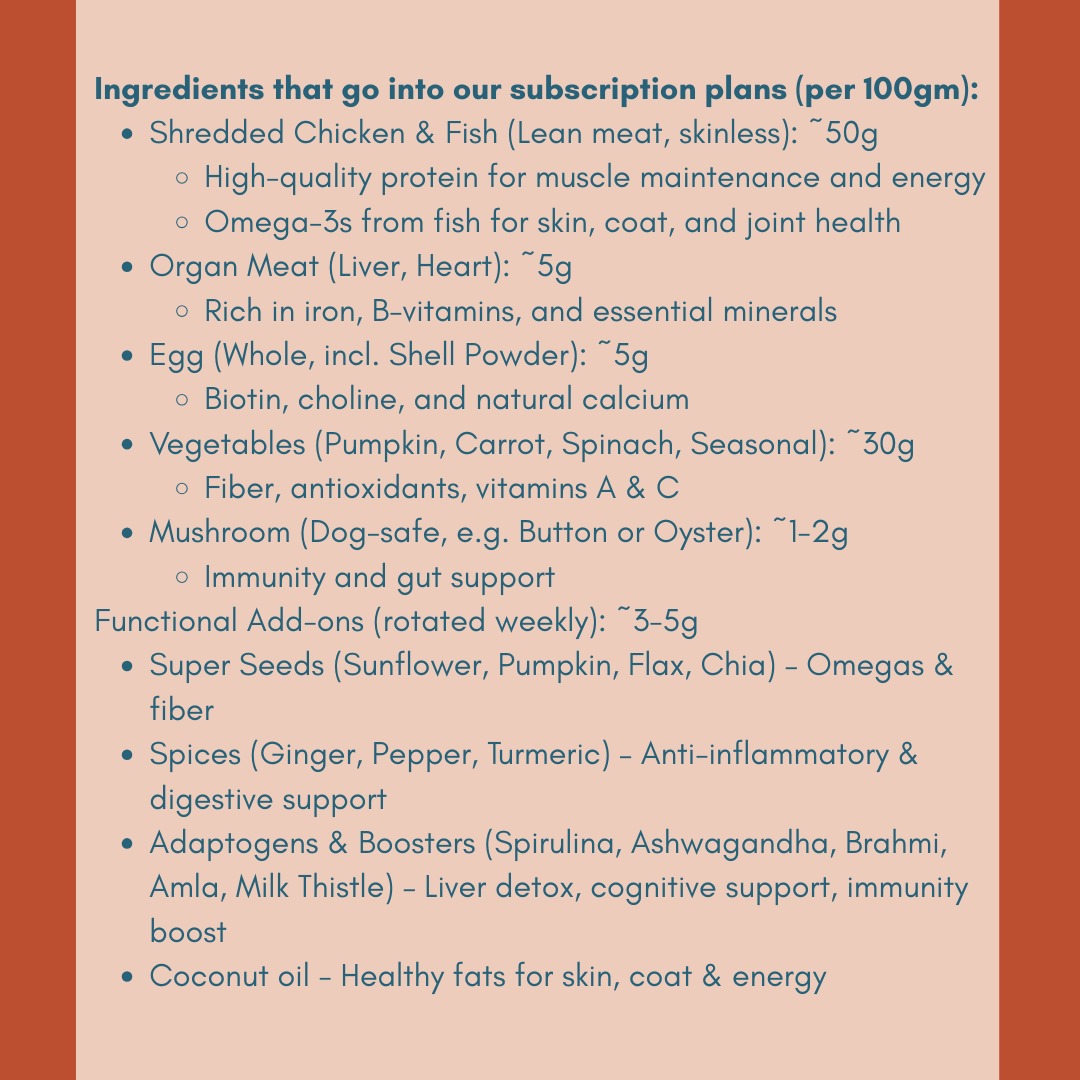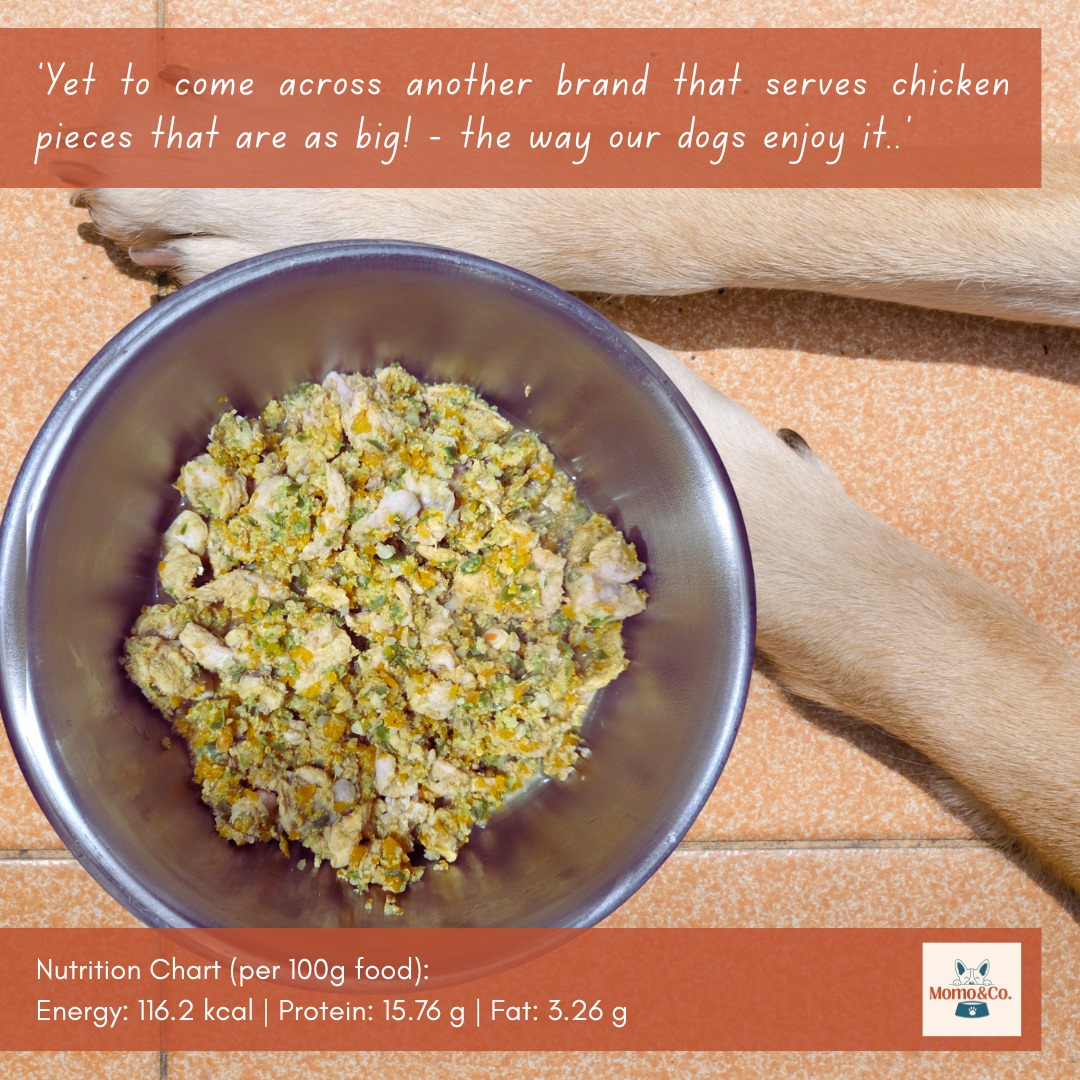---------------------------------
A quick answer.
🚫 5 Reasons NOT to Feed Only Eggs, Paneer, and Vegetables to Dogs:
1. Lacks Essential Nutrients
Dogs need taurine, certain B vitamins, omega-3 fatty acids, and specific amino acids not found in plant-based or dairy-heavy diets.
2. High in Saturated Fats and Cholesterol
Too much protein (like eggs and paneer) and too little calcium can harm bone health.
3. Poor Digestibility
Many vegetables and dairy products are hard for dogs to digest and may cause gas, bloating, or diarrhea.
4. Missing Animal Fats and Organ Meats
These are crucial for skin, coat, and joint health—missing in this vegetarian-style diet.
5. Not Life Stage Appropriate
Puppies, seniors, or active dogs need tailored nutrition, which this limited diet can’t provide.
---------------------------------
Perhaps a lengthier exploration.
As more pet parents explore plant-based lifestyles, some consider the same dietary changes for their dogs. While the intent may be noble—ethical, environmental, or spiritual—feeding a dog a purely vegetarian or vegan diet requires far more care than simply swapping meat for paneer or eggs.
If you’re like many dog parents trying to do your best, you might think feeding your adult dog a diet of eggs, paneer (cottage cheese), and veggies is wholesome and healthy. After all, these foods are packed with protein and look natural.
But when it comes to our dogs, their nutritional needs are quite specific and different from ours. Feeding only eggs, paneer, and vegetables can leave your dog missing important nutrients they need to thrive — sometimes leading to health issues down the line.
Let’s explore why this common vegetarian-inspired combination falls short for your dog, and what a balanced, nourishing diet truly looks like.
Cue question: What are dogs ?
🐩Dogs Are Not Strict Carnivores but Not True Herbivores Either
Dogs descended from wolves but have adapted over 10,000 to 30,000 years living alongside humans. Unlike strict carnivores (cats, lions), dogs can digest starches and some plant material. They have evolved over the years to do so.
🐕Dogs Are Facultative Carnivores
So, are dogs technically omnivores? If they can digest both animal and plant-based foods. Actually, they are facultative carnivores, which means their physiology is optimized for a meat-centric diet. Their sharp teeth, short digestive tracts, and lack of salivary amylase reflect their evolutionary need for animal protein.
“Dog’s genomes have evolved to better digest starch, but a meat-based diet remains essential to provide certain nutrients more abundantly and bioavailable in animal products.”
In addition, young, growing dogs, particularly large-breed puppies, have increased nutrient requirements for the omega-3 fatty acid DHA. This fatty acid is essential for proper brain and vision development and is found mainly in marine sources such as fish and fish oils, but also in some marine algae. It is possible to provide vegetarian sources of DHA from marine algae, but it’s important to consult a pet nutrition expert to avoid nutritional deficiencies.
🍖Dogs Need Varied Animal Proteins
Eggs and paneer are animal-based, yes, but they do not provide the full spectrum of essential nutrients dogs require. For example, Taurine, methionine, and lysine—critical for heart, liver, and immune health—are far more abundant in organ meats and muscle tissue than in eggs or dairy.
(At Momo&Co, we ensure your dog’s meals contain a healthy variety of fresh lean meats, fish, eggs, and organ meats to cover all essential amino acids and maintain robust health.)
The Problem With Egg, Paneer, and Veggie-Only Diets
🥚Eggs Are High in Fat Compared to Lean Meats
Eggs can seem like a convenient and protein-rich choice. However, eggs contain relatively high fat levels compared to lean meats.
- 100g of boiled eggs has around 10–11g of fat
- 100g of skinless chicken breast contains about 3g of fat but more lean protein
🍳Eggs Should Be an Occasional Treat
Veterinarians generally recommend no more than 2–3 eggs per week for medium-sized adult dogs. Too many eggs can cause dietary imbalances, excess fat intake, and nutritional deficiencies over time.
🧈Paneer Is Fatty and Hard to Digest
Paneer contains about 25% fat and 16g of saturated fat per 100g. It also has lactose, a sugar found in milk.
Many adult dogs have low levels of lactase, the enzyme needed to digest lactose, leading to digestive upset such as vomiting, gas, or diarrhea.
In short, Dogs require balanced fat intake, usually between 5–15% of their diet’s dry matter. Long-term feeding of high-fat eggs or paneer— especially for small or less active dogs — can push fat levels too high, increasing risks of pancreatitis(a serious and painful condition), excess fat, obesity, and gastrointestinal distress.
Missing Micronutrients in Egg, Paneer, and Veggie Diets
A diet consisting only of eggs, paneer, and vegetables misses several key micronutrients essential for dog health:
- Iodine: Crucial for thyroid function
- Zinc and Copper: Important for skin, coat, and immune system
- Omega-3 Fatty Acids: Anti-inflammatory fats primarily found in fish
- B-Vitamins (especially B12): Found in higher amounts in organ meats
🥦Nutritional Concerns With Vegetarian Diets for Dogs
Feeding a vegetarian diet to dogs comes with challenges:
- Some essential amino acids (like methionine, taurine, lysine) are lower in plants than in animal tissues.
- Certain vitamins and minerals — especially vitamins A, B12, D and minerals like calcium, phosphorus, potassium, zinc — may be deficient without supplementation.
- High-fiber plant diets may impair absorption and metabolism of some nutrients, including taurine.
- Digestibility of plant proteins is lower than animal proteins, Plant compounds can be harder to break down than meat, impacting nutrient availability.
- Acceptability and taste may be poor for some dogs.
The Vegetarian Diet Can Be Done—But It Must Be Scientific
Yes, dogs can survive on vegetarian diets—but only when:
- Formulated by experts.
- Balanced with proper supplementation.
- Monitored with regular health checks.
- Sudden shifts to vegetarian or vegan diets can stress a dog’s metabolism, similar to how humans may feel during drastic diet changes.
🍗The Risks of Going Fully Meat
While it's clear that an egg, paneer, and veggie diet alone is unbalanced for dogs, it's equally important to recognize that diets consisting exclusively of meat also come with their own set of problems.
Cons of an All-Meat Diet:
- Potential for nutrient imbalances: While meat is rich in protein and certain essential nutrients, feeding only meat can result in an excess of phosphorus and deficiencies in calcium, fiber, and certain vitamins.
- Lack of essential nutrients: All-meat diets often miss out on vital components like fiber, which aids digestion, and phytonutrients present in vegetables that help fight inflammation and disease.
- Risk of contamination: Raw or undercooked meats carry the risk of bacterial contamination, such as salmonella or E. coli, which can affect both dogs and their human family members.
So, Can Kibble Solve It?
While many plant-based kibble brands claim to be balanced, most contain fillers like soy or corn, preservatives, and extremely low meat content—sometimes just 3% protein. Labels that list "meat flavour" or "animal by-product" instead of named meats are red flags.
High-heat processing also destroys many nutrients in kibble. Unless you're buying vet-formulated or prescription kibble, it may not meet your dog's nutritional needs.
- check out our blog post on kibble vs fresh food for dogs
What’s the Best Diet for my dog, Then?
A balanced, meat-based fresh diet is typically the most digestible, palatable, and complete option for dogs. It offers:
- High bioavailability of amino acids
- Better fat profile
- Natural vitamins and minerals
Plant-based diets can work for specific cases (e.g., allergies), but require precise formulation and often cost more due to supplement needs.
🥗Conclusion: Balanced Nutrition Is the Key
While human dietary choices are often based on ideology, your dog's diet should be based on biology. Their health depends on complete nutrition—not just what seems healthy from a human perspective.
A diet that combines high-quality animal proteins with select plant-based ingredients ensures your dog receives all essential amino acids, vitamins, and healthy fats.
- Perfect Balance: Recipes that maintain a 60% meat and 40% veggie ratio.
- Slow-Cooked : Meals prepared through slow cooking to preserve nutrients.
Ultimately, dogs need a complete and balanced diet tailored to their life stage, health needs, and activity level. Feeding a diet exclusively of eggs, paneer, and vegetables risks nutrient imbalances, digestive issues, and long-term health problems.
🐶Our Nutritionally balanced, fresh food subscription plans for dogs in Bangalore
At Momo&Co, we carefully formulate meals that blend fresh meats, fish, eggs, organ meats, and wholesome vegetables to deliver a nutritionally balanced diet your dog will love — supporting their heart, skin, immune system, and energy needs.
we don’t believe in one-size-fits-all meals. We offer expertly balanced, freshly cooked meals tailored to your dog’s life stage, breed, and dietary needs.
Here's our Nutrition Chart


Choosing a scientifically balanced, meat-inclusive diet with added fresh veggies is the best way to ensure your beloved dog thrives, stays healthy, and enjoys every meal.
Make your choice right now, check out our Nutritionally balanced, fresh food subscription plans for dogs in Bangalore .
(Disclaimer: This blog is for informational purposes only and is not a substitute for veterinary advice. Always consult your veterinarian before making significant changes to your dog’s diet.)